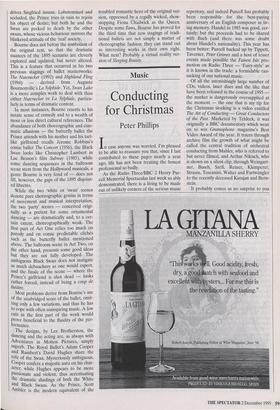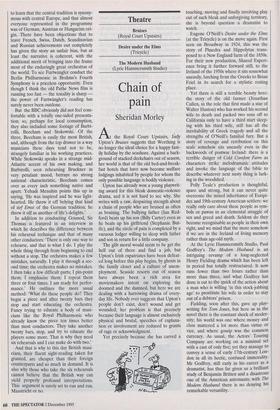Music
Conducting for Christmas
Peter Phillips
In case anyone was worried, I'm pleased to be able to reassure you that, since I last contributed to these pages nearly a year ago, life has not been treating the honest professional so badly. As the Radio Three/BBC 2 Henry Pur- cell Memorial Spectacular last week so ably demonstrated, there is a living to be made out of unlikely corners of the serious music repertory, and indeed Purcell has probably been responsible for the best-paying anniversary of an English composer in liv- ing memory. Handel in 1985 was good, cer- tainly; but the proceeds had to be shared with Bach (and there was some doubt about Handel's nationality). This year has been better: Purcell backed up by Tippett, Taverner, Peter Grimes and a host of lesser events made possible the Fairest Isle pro- motion on Radio Three — 'Fairy-style' as it is known in the trade: a formidable ran- sacking of our national music.
Of all the astonishingly large number of CDs, videos, laser discs and the like that have been released in the course of 1995 the market is dangerously oversupplied at the moment — the one that is my tip for the Christmas stocking is a video entitled The Art of Conducting — Great Conductors of the Past. Marketed by Teldeck, it was originally a BBC documentary which went on to win Gramophone magazine's Best Video Award of the year. It traces through archive film the growth of what might be called the central tradition of orchestral conducting from Mahler, who is referred to but never filmed, and Arthur Nikisch, who is shown on a silent clip, through Weingart- ner, Busch, Szell, Reiner, Klemperer, Strauss, Toscanini, Walter and Furtwangler to the recently deceased Karajan and Bern- stein.
It probably comes as no surprise to you to learn that the central tradition is synony- mous with central Europe, and that almost everyone represented in the programme was of German, Austrian or Hungarian ori- gin. There have been objections that to leave French, Swiss, Dutch, Scandinavian and Russian achievements out completely has given the story an unfair bias, but at least the narrative is coherent, with the additional merit of bringing into the frame most of the enduringly great orchestras of the world. To see Furtwangler conduct the Berlin Philharmonic in Brahms's Fourth Symphony is a priceless opportunity. Even though I think the old Pathe News film is running too fast — the tonality is sharp the power of Furtwangler's reading has surely never been outdone.
But the BBC obviously did not feel com- fortable with a totally one-sided presenta- tion; so, perhaps for local consumption, they also included some footage of Barbi- rolli, Beecham and Stokowski. Of the three, Beecham is easily the most British, and, although from the top drawer in a way musicians these days tend not to be, strangely familiar in his working practices. While Stokowski speaks in a strange mid- Atlantic accent of his own making, and Barbirolli, seen rehearsing Bruckner in very petulant mood, betrays no strong national characteristic, Beecham comes over as every inch something native and apart. Yehudi Menuhin points this up in saying, 'He was inspired and he was light- hearted. He threw it off belying that kind of tief Ernst of the German tradition; he threw it off as another of life's delights.'
In addition to conducting Gounod, Sir Thomas is featured in an interview in which he describes the difference between his rehearsal technique and that of many other conductors: 'There is only one way to rehearse, and that is what I do. I play the whole thing through from beginning to end without a stop. The orchestra makes a few mistakes, naturally. I play it through a sec- ond time; the orchestra makes no mistakes. I then take a few difficult parts; I pin-point them; I emphasise them; I repeat them three or four times. I am ready for perfor- mance.' He outlines the more usual method: 'What do these people do? They begin a piece and after twenty bars they stop and start educating the orchestra. Fancy trying to educate a body of musi- cians like the Royal Philharmonic who already know the piece ten times better than most conductors. They take another twenty bars, stop, and try to educate the players some more. That is why they need six rehearsals and I can make do with two.'
And that is why to this day British musi- cians, their fluent sight-reading taken for granted, are cheaper than their foreign counterparts and so much in demand. It is also why those who take the six rehearsals cannot believe that the British way can yield properly profound interpretations. This argument is surely set to run and run, Maastricht or no.











































































 Previous page
Previous page